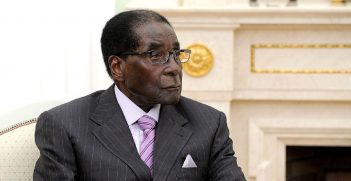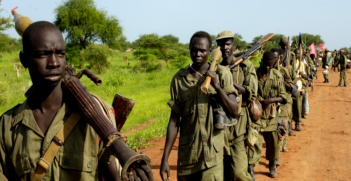Revisiting Zimbabwe: How to Build an African Democracy

Following a soft military coup that led to the resignation of Zimbabwe’s former President, Robert Mugabe, African countries are grappling with what ‘democracy’ means for them.
African countries are thought of as ‘failed’, ‘weak’, ‘fragile’, and ‘collapsed’ states lacking effective governments. Commentators assume that an effective or functional state is one that provides residents with the basic services necessary for their day-to-day survival. States are presumed to be impersonal; everyone should be able to make a living without persecution or fear for their lives. States that can achieve this are regarded as ‘strong’ states, democratic states, or liberal states. These categories were pioneered by analysts and commentators in the Western world. They are now widely accepted, which means most analysts, policymakers and practitioners do not understand the different forms that state strength takes in diverse settings.
Collective amnesia has resulted in many people forgetting that nation-states were established through colonisation, dispossession, and genocide in the majority of the world. This reality includes Western states, like Australia, where indigenous peoples continue to experience these realities. Strong statehood is established and maintained on the basis of violence. In any given state, there will be populations—majorities or minorities—against whom the violence required to maintain the state is constantly enacted. Different states will use different strategies, including manipulation of electoral processes and public opinion. At the same time, a lack of manipulation in a given country does not mean that governance in that country is normatively better.
The categorisation of African states as ‘weak’, ‘failed’, ‘fragile’, or ‘collapsed’ states results in Western countries, and increasingly, China, using these classifications to justify their economic, political, and military interventions in African countries. This is despite the negative ramifications of those interventions, as the Libyan case demonstrates. In today’s world of the global War of/on terror, it is almost sacrilege to question non-African interventions in African countries. It is, therefore, important to view the recent Zimbabwean constitutional or soft coup which led to Robert Mugabe’s resignation after 37 years in power, in this context.
The insistence by the governing ZANU-PF party and military that the coup was an intra-party matter which would be resolved through internal party processes—including impeachment had Robert Mugabe refused to step down—was designed to deter an external intervention in that country. It was also designed to guarantee the governing ZANU-PF party’s electoral victory in this year’s scheduled elections. ZANU-PF, under new Zimbabwean President, Emmerson Mnangagwa’s leadership, has backtracked on its lacklustre commitments to form a unity government with opposition parties in the post-Mugabe era. Despite this, Zimbabweans continue to be optimistic about the future of governance in their country.
Zimbabwe is a strong state that has been maintained through state-sanctioned violence against citizens and residents, poor service delivery, and poverty. However, as it embarks on its new course, it is important to remember how global vested interests militate against African countries becoming self-sufficient.
Lessons from Burkina Faso
Following a coup d’état orchestrated by his then companion Blaise Compaoré, Thomas Sankara became Burkina Faso’s president in 1983. Sankara sought to challenge an international system that maintains African countries’ outward outlook and to keep their economies and lands accessible to former colonial powers. Sankara challenged France, which in the post-independence period has gone to great lengths to keep Francophone African countries tethered to the metropole through questionable partnerships with African elites and through the CFA Franc Zone. Sankara cut ties with the IMF and World Bank, and turned down financial aid. He wanted Burkina Faso—and the whole of Africa—to become self-sufficient by breaking a pernicious cycle of dependency.
Sankara displeased then French President François Mitterrand, neighbouring leader of Côte d’Ivoire, Felix Houphouet-Boigny, and his ally Blaise Compaoré. Compaoré led Sankara’s assassination in 1987 and was Burkina Faso’s president until 2014 when popular protests forced him into exile after attempting to extend his presidential term. Compaoré’s rule was characterised by the reversal of Sankara’s initiatives and the strengthening of relations with France and International Financial Institutions (IFIs). Sankara was a strong advocate of gender equality, collective debt default, and led a simple life. France is widely believed to have played a role in Sankara’s assassination.
Following Robert Mugabe’s resignation, current President Emmerson Mnangagwa has been compared to Sankara, both having come to power through military coups. The danger in these comparisons is not only the continued celebration of the militarisation of African politics, but a non-critical embrace of Mnangagwa’s neoliberal political agenda, which stands in opposition to Sankara’s anti-liberal politics. What’s more, Mnangagwa’s male-dominated cabinet effectively bars women from politics. Moreover, both countries are examples of the different ways in which former colonial powers discipline countries whose policies undermine their interests.
Sankara was assassinated in 1987, while from 2000 onwards Zimbabwe’s economy stagnated as Western investors left following indigenisation policies that sought to redistribute wealth from the white minority to the black majority. Just as the strength of the global ‘rules-based’ liberal order is built on the impoverishment of African states, so too is the strength of African states maintained through impoverishment of their populaces.
The challenge for Africa is, therefore, building self-reliance through demilitarisation and weakening of existing state structures by reducing the barriers of entry to greater political participation by opposition groups, youth, and women. For Zimbabwe this means power-sharing between ZANU-PF and opposition parties in a permanent government of national unity, which countries like the DRC, Kenya and Sierra Leone could potentially learn from.
Tinashe Jakwa is a doctoral researcher at the University of Western Australia. Her research looks at how liberal political systems increase state instability in Africa, and develops alternatives modelled after governments of national unity.
This article is published under a Creative Commons Licence and may be republished with attribution.





